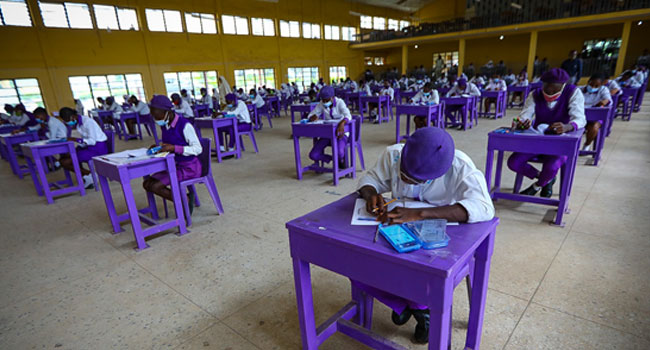The Nigerian Government has reaffirmed its determination to eradicate examination malpractice in Nigeria’s education sector, confirming that it will proceed with the transition to Computer-Based Testing (CBT) for the West African Examinations Council (WAEC) and the National Examinations Council (NECO) by 2026.
This was disclosed by the Minister of Education, Dr Tunji Alausa, during an appearance on The Morning Brief on Channels Television on Tuesday.
His remarks follow increasing concerns about the credibility of public examinations, particularly after the release of the 2025 Unified Tertiary Matriculation Examination (UTME) results, which revealed that more than 1.5 million out of 1.95 million candidates scored below 200 out of 400.
Addressing the issue, Dr Alausa said the results were concerning but reflect the integrity of the process. “JAMB conducts its exams using CBT and has instituted robust security protocols. This has drastically reduced fraud. Unfortunately, WAEC and NECO have not yet achieved the same,” he said.
He revealed that a diagnostic review of Nigeria’s examination systems was initiated upon his assumption of office. “I set up a committee to assess how exams are conducted nationwide, and I expect their report soon,” he stated.
Dr Alausa announced that WAEC and NECO will begin transitioning to CBT in November 2025, starting with objective papers. Full implementation, including essay components, is expected by May/June 2026.
“We must deploy technology to combat exam fraud. The existence of so-called ‘miracle centres’ is unacceptable. Candidates often cheat during WAEC and NECO, only to struggle in JAMB, where cheating has been effectively curtailed,” he added.
He emphasised that malpractice not only undermines meritocracy but also discourages hardworking pupils. “When honest students see others gain unfair advantages, it demoralises them and fosters a culture of dishonesty,” he warned.
Asked whether poor student performance stems from declining educational standards or weak enforcement, the minister acknowledged both but pointed to systemic malpractice as the root issue. “We are improving teaching quality and introducing digital learning tools, but the widespread cheating, particularly in WAEC and NECO, remains our biggest concern,” he said.
Dr Alausa noted that young Nigerians are bright and capable, but their environment often undermines their potential. “It’s not a question of intelligence—it’s about integrity and fairness, and that’s what we are committed to restoring.”
He confirmed that extensive consultations had already taken place with the leadership of WAEC, NECO, NABTEB, and the National Board for Arabic and Islamic Studies (NBAIS).
“From November this year, WAEC and NECO will begin administering CBT exams. This decision is final,” he declared.
The Ministry of Education formally directed WAEC and NECO in April to fully transition to CBT by 2026. WAEC had already piloted CBT in 2023 for private candidates, with over 8,000 participants.


